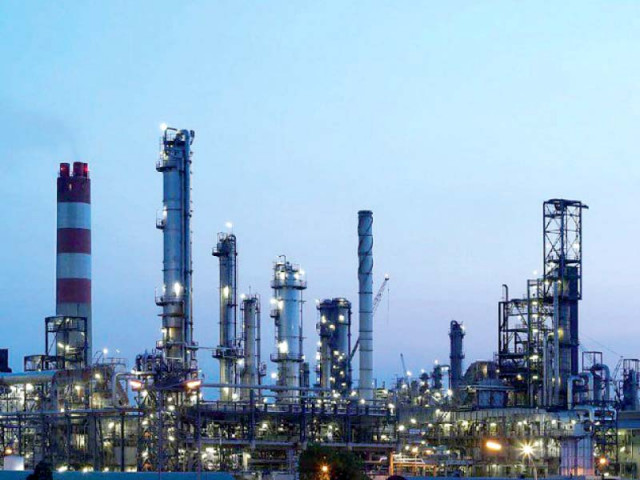Refinery likely to slash investment in plant upgrade
May inject just $500m against earlier plans of investing up to $3b

Pakistan may lose a planned investment of over $2 billion in the oil refining sector as a shareholder of Pak Arab Refinery Limited (Parco) has refused to give its backing to the original plant upgrade plan.
Under the plan, Parco, a joint venture between the governments of Pakistan and Abu Dhabi, was poised to invest up to $3 billion under the new refinery policy for setting up cracking units to convert furnace oil into highly demanded byproducts like petrol and high-speed diesel.
The government has set the deadline of March 20 for signing implementation agreements with refineries under the new policy for upgrading their plants. Prime Minister Shehbaz Sharif is set to attend the signing ceremony.
Sources told The Express Tribune that three refineries – Parco, Pakistan Refinery Limited (PRL) and Byco – had agreed to reduce the production of furnace oil to zero by setting up cracking units. These units convert furnace oil into petrol and high-speed diesel.
However, Parco shareholders have not endorsed the plan as they now want to invest around $500 million in the production of Euro V-standard petrol and diesel.
At the same time, they want to see the refinery continue to produce furnace oil like Attock Refinery Limited (ARL) and National Refinery Limited (NRL). ARL produces furnace oil because it consumes the local crude oil while NRL produces furnace oil for its own requirement.
Read: Mafia pilfering oil from PARCO line roams free
These refineries will also install advanced plants for the production of environmentally friendly Euro V petrol and diesel. The new refinery policy had remained stuck on the table of then petroleum minister for around two years during the tenure of Pakistan Democratic Movement (PDM) government.
However, the caretaker government later made a bold decision by approving the policy. During the interim administration, the Cabinet Committee on Energy (CCOE) approved the new policy, which enhanced the ceiling on withdrawing money from an escrow account from 25% to 27.5%.
PRL has already signed an agreement with the Oil and Gas Regulatory Authority (Ogra) under the new refinery policy. Now, it will ink a supplemental agreement after approval of amendments to the new policy.
Other refineries have so far not struck any deal and have raised several issues like the continuation of 7.5% deemed duty collection on diesel sales after upgrading their plants.
Their concerns also included the tax exemption on incremental capital expenditure to be deposited in the escrow account, project timelines and cost overruns.
During the caretaker government, the CCOE raised the cap on the withdrawal of money from the escrow account from 25% to 27.5%. This money will be spent on upgrading the refineries.
Under the new policy, Pakistan is expected to become self-reliant in the production of diesel.
The oil industry emphasises that the energy sector is the backbone of any economy but unfortunately the core challenges being faced in the realm of economy stem from ill-planning and mismanagement.
The industry points out that finalisation of the badly needed policy took more than four years as final approval was delayed on one pretext or the other.
The policy was notified on August 17, 2023 but it had some anomalies, which were not acceptable to the refineries.
After intense and prolonged consultations among the government, refineries, independent financial and legal advisory firms, the policy was appropriately amended and approved by the CCOE in a meeting chaired by the then caretaker energy minister, Muhammad Ali.
The policy will enable oil refineries to undertake major upgrade projects to not only comply with environmentally friendly Euro V specifications but also increase the production of deficit products such as petrol and diesel by 99% and 47%, respectively.
Published in The Express Tribune, March 20th, 2024.
Like Business on Facebook, follow @TribuneBiz on Twitter to stay informed and join in the conversation.


















COMMENTS
Comments are moderated and generally will be posted if they are on-topic and not abusive.
For more information, please see our Comments FAQ